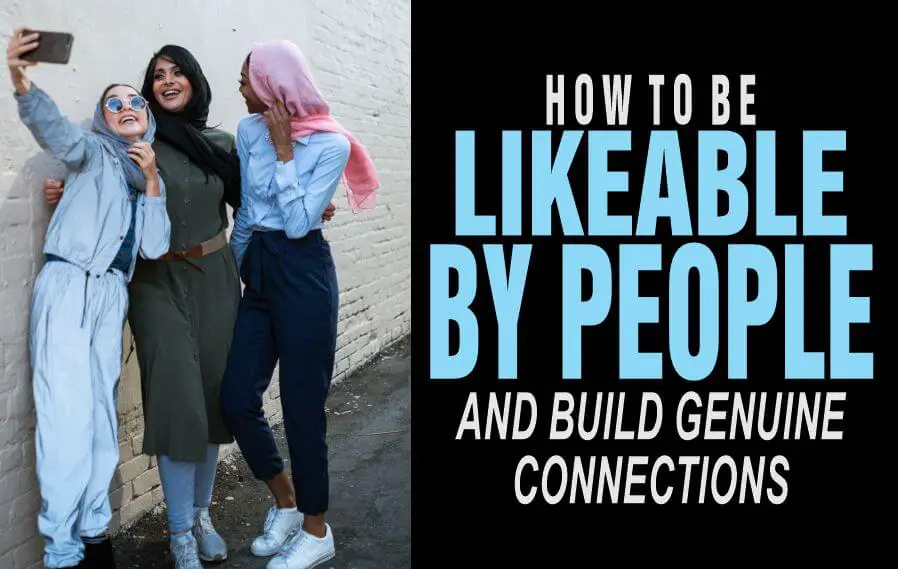To be likeable and have people warm up to you and prefer your company is a beautiful feeling. Here are how to be likeable and build genuine connections.
In both your personal and professional life, likeability plays a crucial role in shaping your relationships and overall success.
The way you are perceived by others greatly influences the opportunities that come your way, making it imperative to enhance your likeability.
I could remember growing up and having my mates always wanting to be in my company and it followed me to adulthood and into midlife.
It happens everywhere I find myself. It is not a surprise to me because I try my best to make everyone around me comfortable.
How I do it is what you are going to be reading in this article. Good enough, they are easy tweaks in your attitude towards people.
Understanding Likeability

Likeability is a measure of your social attractiveness and ability to connect with others. It includes traits such as friendliness, kindness, warmth, and a positive attitude.
Being likable is having a pleasant personality that is nice and agreeable to people and makes you socially accepted.
People want to be around you because they are comfortable or safe in your company.
It requires psychological maturity to bring yourself to delight every person who comes across you. It has to do with something in your personality and how you handle and approach issues.
Likeability is natural to some people while others can learn how to be likable deliberately by mastering the psychology behind it and doing the little but potent things to attract people’s love.
Being a very likable person right from when I was a kid, I can say that it’s not hard to endear yourself to people.
Psychologically, likeability is the extent to which someone is liked or perceived as pleasant and attractive by others.
It is a social construct based on interpersonal interactions and can have a significant impact on relationships, both personal and professional.
Impact of Likeability on Relationships

Likeability affects relationships by influencing how others perceive and respond to you.
People who are likeable are more likely to be trusted, supported, and included in social groups.
They tend to have more fulfilling and supportive relationships, as their positive qualities make them enjoyable to be around.
Here are some of the impacts of likeability on relationships:
Building Trust: Likeability helps in encouraging trust and emotional connection in relationships. People tend to trust and feel more comfortable with individuals they find likeable. By being likeable, individuals can create a safe space where others feel secure and are more likely to open up.
Enhanced Communication: Likeable people are generally better at effective communication, as they possess good listening skills and are able to express themselves clearly. This can lead to smoother and more meaningful conversations, allowing for deeper understanding and a stronger bond between individuals in a relationship.
Positive Influence: Likeable individuals tend to have a positive impact on the people around them, including in relationships. Their positive energy, optimism, and supportive nature can uplift and motivate others. They may also serve as role models, inspiring others to adopt similar positive behaviors and attitudes.
Increased Cooperation: People are more likely to cooperate and collaborate with those they find likeable. Individuals who have this gift are skilled at building rapport, finding common ground, and resolving conflicts amicably. This facilitates healthy teamwork and cooperation in various relationship dynamics, such as friendships, partnerships, or professional relationships.
Strengthened Emotional Bonds: Being likeable contributes to the emotional intimacy and closeness between individuals in a relationship. By being likeable, people create a sense of warmth and acceptance that fosters deeper emotional connections. It leads to increased empathy, understanding, and support, which are essential pillars of healthy relationships.
Attractiveness and Longevity: Likeable individuals often attract more people into their lives. Their positive characteristics, such as kindness, humour, and confidence, can make them more appealing and likable, which can lead to the formation of new relationships. Moreover, likeability also plays a role in relationship longevity, as people are more willing to invest time and effort in maintaining relationships with those they find likeable.
Difference Between Being Likeable and Being Popular

Being likeable and being popular are related but distinct concepts.
Likeability focuses on individual traits and personality characteristics that attract others and form genuine connections.
Being popular usually signifies being well-known or having a large social circle, but it does not necessarily indicate a genuine likability or ability to maintain meaningful relationships.
Popularity can be based on factors such as social status, wealth, or physical attractiveness, whereas likeability is rooted in personal qualities such as empathy, humour, and the ability to listen and engage with others.
The Science of Likeability: Psychological and Sociological Aspects

The science of likeability covers various psychological and sociological aspects.
From a psychological standpoint, research suggests that likeable individuals often possess traits such as emotional intelligence, self-confidence, and a sense of humour.
They are skilled in managing their emotions, understanding the perspectives of others, and adapting their behaviour to different social situations.
From a sociological perspective, likeability can be influenced by societal norms, cultural values, and the desire for acceptance.
The sociological aspect of likeability explores how individuals are socialized to conform to certain behavioural patterns, social roles, and expectations in order to be liked and accepted by others.
Additionally, studies have shown that factors such as physical attractiveness, similarity to others, and perceived competence can also impact likeability.
Positive first impressions, active listening, and displaying genuine interest in others are further aspects that contribute to being likeable.
How to Be Likeable

1. Build Self-awareness
Building self-awareness is an essential component of being likeable. By understanding our own strengths, weaknesses, and emotions, we can actively manage our behavior and interactions with others.
It allows us to be genuine, empathetic, and open-minded, which are highly attractive qualities.
Self-aware individuals have the ability to regulate their emotions, actively listen, and respond in a calm and thoughtful manner.
They are also sensitive to the needs and feelings of others, making them approachable and trustworthy.
By continuously developing self-awareness, we can improve our social skills, enhance our relationships, and ultimately be more likable to those around us.
2. Cultivating Empathy
Cultivating empathy is a powerful tool to become more likeable. By actively putting yourself in someone else’s shoes, you can understand their feelings and perspectives.
It involves listening with genuine attention, validating emotions, and responding with compassion.
When people feel heard and understood, they naturally gravitate towards those who demonstrate empathy.
This ability to empathize creates a connection, promotes trust and better communication.
3. Effective Communication
Effective communication is vital for likability as it enables clear understanding and connection with others.
Being a good listener shows that you value and respect their opinions, building trust and rapport. Using clear, concise language helps prevent misunderstandings.
Non-verbal communication, such as maintaining eye contact and open body language, shows attentiveness and genuine interest.
Articulating thoughts and ideas calmly and respectfully enhances your credibility and approachability.
By practicing effective communication, you show others that you are open, friendly, and capable of building strong relationships.
4. Developing Positive Attitudes
Developing positive attitudes is a key way to increase likability. By cultivating a positive mindset, you become more optimistic, approachable, and enjoyable to be around.
People with positivity radiate warmth and enthusiasm in their interactions, making others feel comfortable and valued.
They are more likely to find solutions rather than dwell on problems, creating a sense of collaboration and empowerment.
Ultimately, developing positive attitudes allows individuals to encourage strong connections and build positive relationships, enhancing their likability and leaving a lasting impression.
5. Building Trust and Reliability
Building trust and reliability involves consistently demonstrating that one can be relied upon and trusted by others.
By keeping promises, being transparent and honest, and delivering on commitments, one earns the trust and respect of others.
This not only establishes credibility but also cultivates a sense of dependability.
By consistently exhibiting these qualities, individuals become likeable as others perceive them as trustworthy, reliable, and someone they can count on.
6. Finding Common Ground
I have always tried to study people to find common grounds where we can vibe.
This gives the person an opportunity and the comfort they need to open up, interact and express themselves without reservation.
Finding common ground is a powerful tool to establish likability. It involves identifying shared interests, values, or experiences with others, creating a sense of connection and understanding.
By highlighting similarities instead of differences, you encourage positive rapport and open lines of communication.
7. Be the First to Show Love
A few people would take the initiative of being the first to be good to others. The majority of the people would rather not give until they receive it.
If everyone had this mentality, we would have everyone waiting for a long time. Showing love first makes things easier for you and others because you have shown leadership and others will follow.
And even if they don’t, you continue to show love because you don’t do it because you want it back.
8. Be Polite
Politeness can never go out of fashion. No matter the age of the other person, observing all polite courtesy will endear you not just to them, but to observers.
It does not take anything away from you to be polite, just know the right words and the best behaviour to put forward.
People being rude to you should not be an excuse to reciprocate on the same path. Win them over by being polite.
However, this does not mean you should let people trample on you. You can be polite and be firm as a rock.
9. Be Respectful
It takes an emotionally intelligent person to be respectful to everyone, including people who have the tendency to be rude.
You are not being respectful because you want to impress, but because it’s who you are and what you chose. Of course, you know the benefits therein.
When you are respectful, you endear people to you and also show others how to be likable.
10. Have a Pure Heart
Having a pure heart is the first step to learning how to be likable to people around you.
If you don’t have a pure heart, there is no way you are going to project positive energy.
Our behaviours are a reflection of how our hearts are. If you harbour bitterness and contempt, that’s of course what your behaviours would show, no matter how you try to cloak it.
11. Love Humanity
You must love humanity to be able to project love to everybody. Humans pick up positive energy from people by being intuitive, even if they can’t explain it.
This pure love makes your behaviours around them pure and transparent devoid of scheming. And it should be an all-around love extended both to animals and the environment.
12. Unselfishness
Being unselfish will always disarm people around you, especially in our world today where self-interest rules.
Being unselfish and doing little gestures to people makes them comfortable with you.
It does not hurt to go out of your way to help others. It could be as simple as helping them pick up something on your way for them or giving unrequested assistance.
Scheming and always looking out for yourself would rather pitch you against others and deflate whatever positive reputation you have.
13. Have a Positive Pntention
This is similar to having a pure heart, but it is specific to each encounter with people. With each encounter, don’t always antagonize people.
Even when you have to argue, let your argument be driven by the best of intentions according to the situation and not just to spite or win the argument.
14. Stand out from the Bandwagon
Standing out from the crowd would always put you in the spotlight especially when you are standing out for good.
There is always a bandwagon belief on issues and people don’t seem to think things through so far others are going in the same direction.
Stepping back and having your own genuine opinion on issues will endear you to people.
15. Be Humble
Being humble is being modest in the way you present yourself without flaunting status, wealth, or anything that makes you superior to others.
Instead of relishing in praises and being proud, a humble person will be embarrassed by eulogies and praises.
Being humble is simple and yet, a very hard thing for people to do. You endear yourself when you stoop low to people’s level for whatever reason without discrimination.
16. Don’t be Combative or Overly Criticizing
Learning how to be likable is not complete without understanding that being combative or always critiquing people would rather push them away from you.
When you always fight people or point out their wrongdoings in a condescending way, you sow the seed of contempt in them.
If you must point out people’s misdemeanors, do that with respect and in love.
17. Be Generous
A generous person is a person who is willing to give his resources – money, time, and themselves.
Being generous for something in return is not it, but being generous because you are compelled to be so from your heart without being manipulative.
When people see this virtue in you, they gravitate toward you in a likable way.
18. Disagree Politely
Just as described somewhere above, being likable doesn’t mean you won’t disagree or have a dissenting opinion.
However, while disagreeing, you have to do so with respect and know when the situation is degenerating.
A likable personality would not trade his likeability on the anvil of petty arguments.
19. Tolerance
Tolerating people is hard these days with people becoming increasingly irritable and impatient.
This requires maturity, patience, and self-control to be able to understand people beyond their behaviours.
When you give people long ropes and tolerate their shortcomings, you endear yourself to them. This does not however mean you will ignore it absolutely.
20. See Everyone as a Teacher
Don’t go parading yourself as ‘know-it-all’. Be humble enough not to flaunt your knowledge unnecessarily.
Always have the mindset that everyone has got something to teach. In this way, you will treat people with respect irrespective of their status.
21. Don’t Compete with People
Competitiveness makes people see you as a rival. Everything in life should not be competition. There are times you let go especially if it’s a petty competition that won’t add value.
Competitiveness breeds toxicity and unnecessary animosity and scheming between people.
Doing away with your ego and instead making people feel better about themselves would endear you to them and become likable.
22. Forgive, Even when they don’t Deserve it
Do away with anger and grudges. Instinctive retaliation makes humans respond when offended.
The average person would get his pound of flesh if he had the opportunity. But a likable person would ignore and instead do the opposite by forgiving.
This almost always disarms the other person and makes them indebted to you.
Instead of being retaliatory, show leadership and maturity by forgiving.
Misconceptions About Likeability
Likeability, contrary to what people think is not a weakness or becoming a people’s pleaser, but a result of knowing how to project yourself to others and come out as trustworthy and reliable.
It does not mean you have to sacrifice your core values or well-being in exchange for people’s approval.
Men especially are very sensitive to their social perception that they sometimes go against their hearts to appear more masculine and respectable.
But this sometimes puts their likeability on the line and limits the goodwill they receive from people.
Being likable does not mean you won’t have opposing views on issues. The way you disagree on issues is what makes you more likable.
Our actions and behaviours around people determine how they see us. People either warm up to you and accept you with open arms or they avoid you or better still, stay neutral.
Whereas some people don’t care how they are perceived, some are sensitive enough to mould themselves to appear a certain way to people and yield the desired result.
While some people are natural at this, people can learn to develop the traits that can endear them to people.
Benefits of Being Likable
Being likable comes with perks that you might not know until you are in the shoes of a likable person.
My friends use to get into a fight or argument and all of them would bring the case for me to judge, currying my favour. This gives me a kind of status and importance I never asked for.
Here are some of the benefits you get when you are a likable person.
1. Genuine Connections
When you are likable, you enjoy a good relationship with people and have very potent channels both for business and favours.
Because you have shown to be reliable and dependable, people would be eager to reciprocate in whatever way they can.
2. More Chances of Success
Likeability brings about new opportunities because you would be recommended for your dependability.
Hinging on the genuine connections you have, it’s easy to expand the already-built circle to your advantage.
3. Less Stress and Greater Wellbeing
Being likable improves mood and your mental state with a reduced risk of anxiety, depression, and other mental-health-related conditions.
It also supports a stronger immune system and heart health with a low risk of diseases while extending your life.
Frequently Asked Questions
What makes a likeable person?
A likable person is someone who possesses qualities such as kindness, empathy, good communication skills, a positive attitude, and the ability to make others feel comfortable and valued.
How do I know if I’m likeable?
You can gauge your likability by observing how others respond to you, whether they enjoy spending time with you, seek your company, and show genuine interest in your thoughts and feelings.
What does it mean to be a likeable person?
Being a likable person means being able to connect with others on a genuine level, making them feel valued and appreciated, and creating positive and harmonious relationships.
Is being likeable a talent?
Likability is not solely a talent but a combination of learned skills and innate qualities. While some individuals may naturally possess certain traits that make them more likable, anyone can develop and enhance their likability through practice and self-improvement.
Conclusion
Knowing how to be likable might not be your problem right now, but it sure helps to project a dependable personality.
The majority of the time, your success is at the mercy of your reputation and perception by others.
Waiting for others to extend their goodwill to you before you can do the same is in bad taste.
As a person who aspires to be likeable, you should be the first to show you are ahead.
While you are at it, remember that life is short and should be spent majorly to make people happy and you will be remembered for that.
Thanks for reading. We accept corrections and suggestions in the comment box.
References:
- How to Make People Like You: 10 Tips to Make New Friends
- How to Be More Likable: 5 Powerful Habits to Charm Anyone
- Five Ways to Create Genuine Connections That Matter
Pious Clements is the insightful voice behind "The Conducts of Life" blog, where he writes about life ethics, self-development, life mastery, and the dynamics of people and society.
With a profound understanding of human behaviuor and societal dynamics, Pious offers thought-provoking perspectives on ethical living and personal growth.
Through engaging narratives and astute observations, he inspires readers to navigate life's complexities with wisdom and integrity, encouraging a deeper understanding of the human experience and our place within society.
